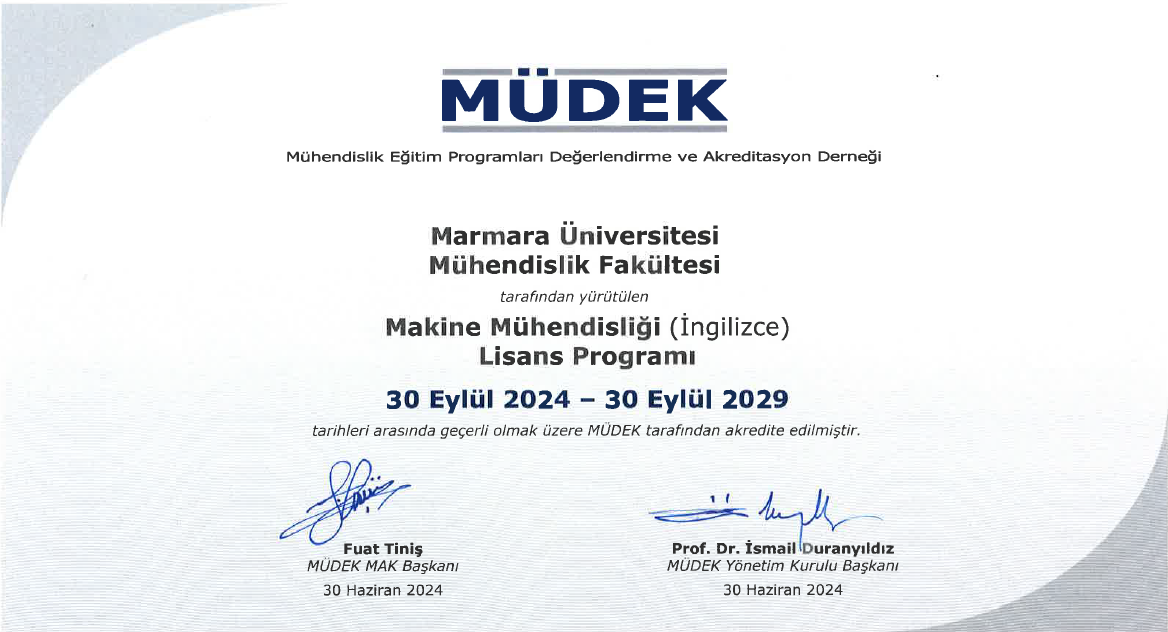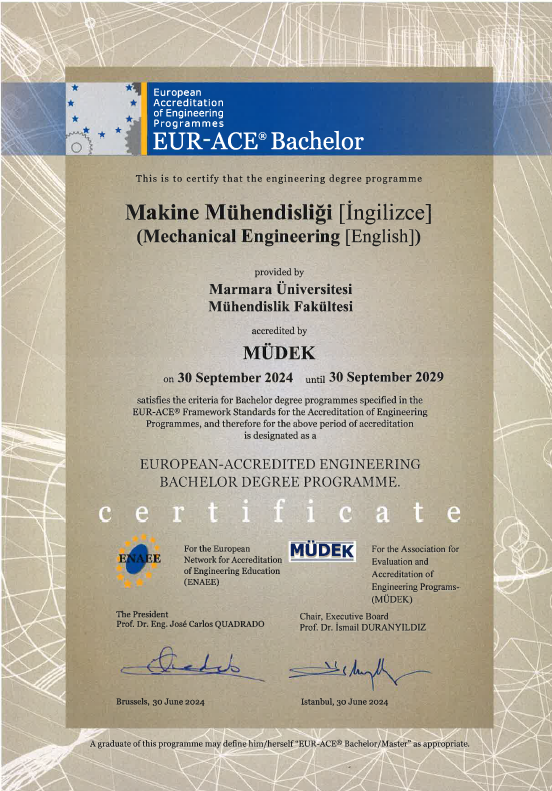MÜDEK
Marmara University - Faculty of Engineering, Department of Mechanical Engineering Undergraduate Education Program has been accredited by MÜDEK for the period between September 30, 2024 and September 30, 2029. It has also been awarded the "European ACcredited Engineer Label" (EUR-ACE) for the duration of the accreditation.


What is accreditation?
*Accreditation is the process of certifying the technical and administrative competence of organizations (Conformity Assessment Bodies) that perform testing, analysis, inspection, and certification procedures for a product or service to demonstrate its conformity with market requirements, standards, and regulations. These organizations are audited by an official authority according to international criteria, and their technical and administrative competence is verified and audited at regular intervals.
*A brief definition:
Accreditation is the certification that a product or service meets a specific quality standard.
What is MÜDEK? What does it do?
MÜDEK stands for: Association for Evaluation and Accreditation of Engineering Curricula.
MÜDEK is a non-governmental organization that works to contribute to improving the quality of engineering education in Turkey by conducting accreditation, evaluation, and informational studies for engineering programs in various disciplines.
What is the purpose of MÜDEK?
MÜDEK's purpose is to contribute to improving the quality of engineering education in Türkiye by conducting accreditation, evaluation, and informational studies for engineering programs in various disciplines. Thus, it aims to advance the welfare of society by producing better-educated and more qualified engineers who understand current and emerging technologies.
What is MÜDEK?
Introduction
The Engineering Programs Evaluation and Accreditation Association (MÜDEK) is a non-governmental organization that works to contribute to improving the quality of engineering education in Turkey by conducting accreditation, evaluation, and informational studies for engineering programs in various disciplines.
MÜDEK was established in 2002 by the Engineering Deans Council (MDK), comprised of the deans of engineering faculties in Turkey and the TRNC, as an independent, non-governmental platform known as the Engineering Evaluation Board. The Council aims to develop and implement a comprehensive program for evaluating engineering undergraduate programs within these faculties.
Purpose
MÜDEK's mission is to contribute to improving the quality of engineering education in Türkiye by conducting accreditation, evaluation, and informational studies for engineering programs in various disciplines. This will, in turn, advance the welfare of society by producing better-trained and more qualified engineers who understand current and emerging technologies.
National Recognition
MÜDEK's application to the Council of Higher Education on October 31, 2007, was reviewed and approved at the Council's General Assembly meeting held on November 16, 2007. It was decided that, in accordance with Article 7/e of the relevant regulation, higher education institutions should be recognized by the Council of Higher Education as a national quality assurance organization focused on national, sectoral, and program competencies in engineering programs and receive a Quality Assessment Certificate valid for five years.
International Membership and Authorization
MÜDEK has been a full member of the European Network for Accreditation of Engineering Education (ENAEE) since November 17, 2006. By decision of the ENAEE Administrative Council dated January 21, 2009, it was authorized by ENAEE to award the EUR-ACE Label. MÜDEK has been a member (signatory) of the IEA (International Engineering Alliance) Washington Accord since June 15, 2011.
What is MÜDEK Accreditation?
It is an International Education equivalence/equivalence certificate issued by MÜDEK based on engineering programs applying for accreditation meeting the criteria determined by MÜDEK.
How many MÜDEK accreditation criteria are there, and what are they?
Criterion 1. Students
Criteria 2. Program Educational Objectives
Criteria 3. Program Outcomes
Criteria 4. Continuous Improvement
Criteria 5. Curriculum Plan
Criteria 6. Faculty
Criteria 7. Infrastructure
Criteria 8. Institutional Support and Financial Resources
Criteria 9. Organization and Decision-Making Processes
Criteria 10. Program-Specific Criteria
How long is MÜDEK Accreditation valid?
The MÜDEK accreditation application and final evaluation process takes an average of 1.5 years. Following this process, applicant programs receive:
A 5-year uninterrupted accreditation if they meet all relevant criteria.
A 2-year accreditation if WEAKNESSES in relevant criteria are identified.
If any deficiency in the relevant criteria is detected, the applicant department cannot receive accreditation, and the fee paid will not be refunded to the department by MÜDEK.
What is EUR-ACE?
It is a set of standards for the accreditation of engineering education programs. Engineering programs that meet these standards are awarded this label.
In 2009, MÜDEK was authorized by the European Network for Accreditation of Engineering Education to award the EUR-ACE label to engineering programs it accredits. It is the seventh agency in Europe authorized to do so.

What are the benefits of the EUR-ACE Label for engineering students and graduates?
The EUR-ACE ® label certifies that engineering programs meet both European and international standards, thus ensuring their recognition by European employers.
EUR-ACE ® facilitates applications to Master's and Doctoral programs at other Higher Education Institutions.
In countries where the engineering profession is regulated, EUR-ACE ®-labeled programs meet the educational requirements required to become a Registered or Chartered Engineer.
Upon recognition of Professional Qualifications, the EU Directive facilitates graduate mobility in EUR-ACE ®-labeled programs.
EUR-ACE ® is an educational standard promoted by FEANI (European Federation of National Engineering Associations), similar to a professional certificate.
EUR-ACE ®-labeled programs are automatically included in FEANI's EUR-ACE education requirements lists.
WORK TO BE CARRIED OUT DURING THE MÜDEK PROCESS
During this process and beyond, we, as a department, will engage in a mutual exchange of ideas with both our internal and external stakeholders. The suggestions/advice we receive from our stakeholders to further enhance our department's educational opportunities and educational quality are crucial to us. Various data collection techniques, such as surveys and face-to-face interviews, will be used to ensure continuous improvement throughout the process. The majority of the surveys will be administered online, while the remainder will be administered in written form in classrooms. Statistical survey results and any improvements made or to be made will be shared with you on the departmental bulletin board. For surveys to achieve their objectives, both high participation and candid responses are crucial.
Types of Surveys to be Conducted:
Employer/Administrator Surveys
Graduate Student Surveys
Student Course Evaluation Surveys
Student Satisfaction Surveys
Student Internship Surveys
New Student Survey
Continuous improvement activities will be carried out based on the data collected from these studies, and numerous infrastructure projects will be undertaken.
MÜDEK Evaluation and Accreditation Studies Official Website
Dear Students and Stakeholders,
MÜDEK is not a complaint body for students and stakeholders. Please try to convey any problems you encounter in our department and your suggestions to the relevant parties by following the steps below.

This page updated by Mechanical Engineering on 16.08.2025 07:38:17
